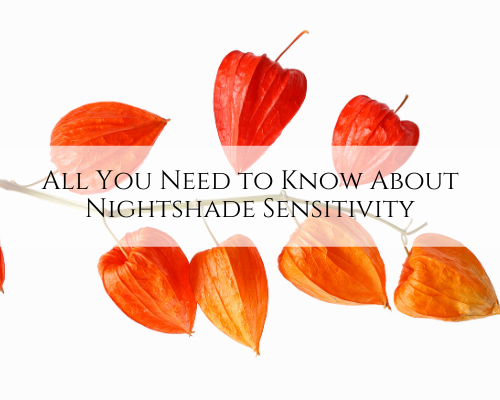Ever eat a meal with tomatoes, eggplants, or peppers and experience digestive issues or joint pain? A nightshade sensitivity could be to blame, causing inflammation in your body. A nightshade sensitivity isn’t a true food sensitivity. It is actually an intolerance; which means your body is not able to digest these foods properly, which can lead to a range of symptoms. We discuss the difference between food allergy, sensitivity, and intolerance in our blog, “The Connection Between Autoimmune Disorders and Food Sensitivities.”
You may have already tried an elimination diet to rule out gluten or dairy as the common culprits and you are still having symptoms. Let’s talk about nightshades, what they are, and why they could cause issues with your health.
What Are Nightshades?
Nightshades are plants that belong to the Solanaceae family and include approximately 2500 species (although most are not edible and some are poisonous). A well-known poisonous variety is belladonna and can be fatal if eaten. Nightshade vegetables and fruits are eaten around the world and are a common part of many cuisines.
Nightshade Food List
- Tomatoes
- Tomatillos
- Potatoes (white and red varieties)
- Eggplant
- Peppers
- Pimentos
- Goji berries
- Ground cherries
- Ashwagandha
Also, red spices including paprika, curry powders, chili powder, cayenne powder, and red pepper are all nightshades. Tobacco is also a nightshade.
Foods often mistaken for nightshades (but are not) are zucchini, sweet potatoes, mushrooms, onions, and black pepper.
Are Nightshades Bad For You?
Nightshades are not bad for most people. They are nutrient-dense foods, rich in vitamin C, iron, fiber, protein, potassium, and antioxidants including lycopene and anthocyanins (found in tomatoes). They are a part of a healthy diet and are often recommended for cancer prevention and heart health. Besides, they contain an alkaloid compound called anatabine. Studies show that anatabine has anti-inflammatory properties and helped those with joint pain, joint stiffness, and certain autoimmune disorders. Peppers contain capsaicin which has anti-inflammatory benefits in the gut and joints.
Symptoms After Eating Nightshades
While many people can eat nightshades without a problem, others may experience digestive, joint, brain, or skin symptoms due to nightshades. Perhaps you find that every time you eat that plate of eggplant parmigiana or fries, you feel awful. That may be because you have an intolerance to nightshades. You may also have an existing autoimmune disorder or inflammatory condition that may be triggered by nightshades.
Nightshades contain saponins (steroid or triterpenoid glycosides), which may impair digestion and limit nutrient uptake.
Lectins are present in nightshades and may contribute to leaky gut and inflammatory bowel disease in people with food sensitivities or autoimmune disease. Lectins are carbohydrate-binding proteins that can be resistant to digestion. These proteins can enter our circulation causing nutrient deficiencies, digestion issues, and severe intestinal damage according to research. Studies show that undigested lectins can get past these barriers and trigger an immune response, possibly setting off autoimmunity.
Nightshades are high in a glycoalkaloid compound called solanine. Many people think this can cause inflammation, but we are still lacking scientific evidence to support this.
Symptoms can take up to 72 hours to appear:
- Acne
- Bloating
- Brain fog
- Diarrhea
- Fatigue
- Gas
- Heartburn
- Hives
- Joint pain or swelling
- Migraines
- Nausea
- Other gastrointestinal issues
Is it a nightshade allergy?
First, it is important to make sure you do not have an allergy to nightshades, which is very rare. Symptoms include hives, skin rashes, itchiness, nausea, vomiting, and achy muscles and joints. If you suspect any kind of food allergy you should contact your healthcare provider immediately as this is a severe reaction and can result in anaphylaxis, a potentially life-threatening allergic reaction that can occur in seconds or minutes of exposure.
Your doctor can find out if you have a nightshade allergy with a skin prick test or a blood test.
Nightshades and Autoimmune Disorders
Autoimmune disease is when your immune system attacks healthy cells, resulting in inflammation and tissue damage. Some autoimmune diseases include rheumatoid arthritis, lupus, inflammatory bowel disease (IBD), multiple sclerosis (MS), type 1 diabetes, Guillain-Barre syndrome, psoriasis, Grave’s disease, and Hashimoto’s thyroiditis.
Some of the compounds in nightshades can be harmless to most people. However, they can contribute to auto-immune flare-ups if you already have an existing autoimmune condition. Many people have leaky gut as the root cause of their autoimmune condition and the compounds in nightshades can irritate the gut further and cause more inflammation.
- Capsaicin in peppers can irritate the gut and cause other digestive issues.
- Solanine in high levels can cause stress in the body.
- Saponins can create an exaggerated immune response.
Nightshades and joint pain
Removing nightshades from the diet can make a big difference for joint pain. We see this frequently in our clinic. Other clinicians and people report it, too. However, there is not yet strong scientific evidence that nightshades cause joint pain or arthritis. Each person is unique and this might be another reason why there isn’t strong evidence linking nightshades to joint pain. The gold standard for determining a food sensitivity or intolerance is to eliminate the food and later reintroduce it while watching for symptoms. This has a proven track record and in our patients who have joint pain, we will do this test, to find out if nightshades might be the culprit.
What is the Root Cause of Food Sensitivity?
Many people wonder how they developed food intolerances or sensitivities. They might say, “I’ve always eaten potatoes. Why is it a problem now?” Food intolerances and sensitivities are a sign of a deeper problem. It indicates that the gut lining may be weak, which makes foods more harmful to your body. Leaky gut, or intestinal permeability, is when your gut lining wears down and is no longer able to protect you from the bacteria, toxins, and undigested food particles that travel through the gut.
Holes in the gut lining allow these particles to escape from your gut and reach your bloodstream, where they can set off a “red alert” of inflammation. Leaky gut can also affect your gut microbiome. Leaky gut is thought to be the root cause of many autoimmune diseases, including Crohn’s disease, celiac disease, type 1 diabetes, multiple sclerosis, and ankylosing spondylitis.
Elimination Diets Help to Discover Food Sensitivities
Your functional medicine doctor may suspect a nightshade intolerance. An elimination diet can help narrow down the foods that might be causing your symptoms, such as nightshades. The next step is to heal your gut. This can be done by removing the problematic foods, improving your digestive function with enzymes and stomach acid, boosting the gut microbiome, and healing the gut lining with glutamine, aloe, DGL, and zinc carnosine. Only after your food intolerance is pinpointed and the gut is healed can nightshades be re-introduced to your diet.
Alternatives to Nightshades
You might be a little overwhelmed at the thought of taking a break from nightshades because the standard American diet is loaded with nightshades. Think pizza, chili, French fries, spaghetti sauce, chips with salsa, or mashed potatoes. Many cuisines around the world use nightshades as a staple ingredient. Mediterranean, Middle Eastern, Mexican, Italian, and South American recipes are just some of the cuisines that rely heavily on these. But don’t worry. Eating a nightshade-free diet is totally doable and it’s still delicious. These substitutions can be made to cut nightshades our of your meals, without sacrificing taste too much.
- Instead of potatoes try sweet potatoes or plantain chips
- Instead of tomatoes try strawberries, blueberries, or pineapple
- Replace peppers with cucumbers, radishes, and carrots
- Portobello mushrooms and zucchinis are a great substitute for eggplant
- Use black pepper, ginger, horseradish, or garlic instead of nightshade spices
Board Certified in Integrative Medicine
Certified Functional Medicine Practitioner
Institute for Functional Medicine Certified Practitioner






